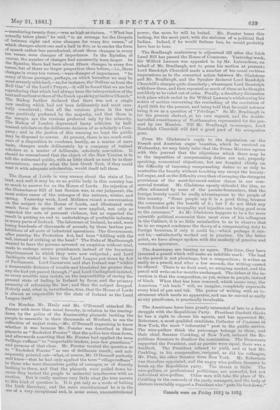From Mr. Gladstone's reply to the deputation on the French
and Austrian sugar bounties, which he received on Wednesday, we may fairly infer that the Prime Minister agrees with this journal that the objections which there may be to the imposition of compensating duties are not, properly
speaking, economical objections, but are founded chiefly on the difficulty of imposing compensating duties so as only to neutralise the bounty without touching any except the bounty- fed. sugar, and on the difficulty even then of escaping the stringent provisions of the most-favoured-nation clause in our com- mercial treaties. Mr. Gladstone openly ridiculed the idea, so often advanced by seine of the pseudo-freetraders, that the foreign bounty could be really advantageous to the people of this country. " Some people say it is a good thing, because the consumer gets the benefit of it ; but I do not think any benefit founded on inequality and injustice can bring good even to the consumer." As Mr. Gladstone happens to be a far more scientific political economist than most even of his colleagues in the Cabinet, it is no little satisfaction to us to observe that he in no respect condemns the theory of a compensating duty to foreign bounties, if only it could be,—which perhaps it can- not be,—satisfactorily worked out in practice. On the latter point, we have always spoken with the modesty of genuine and conscious ignorance.


































 Previous page
Previous page